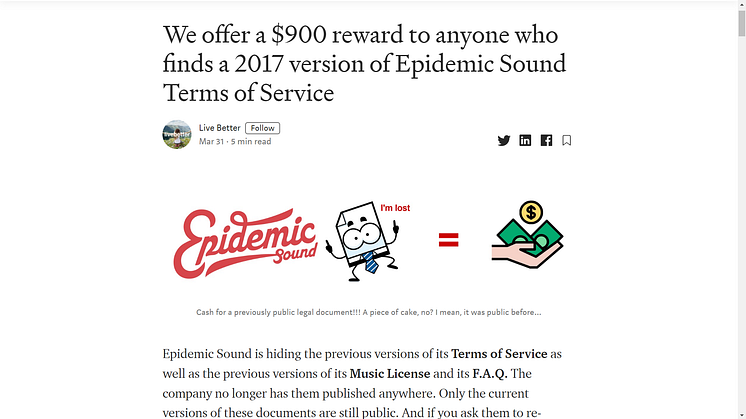
News -
YouTube channel owner offers reward for lost Terms of Service
What do you do if you licensed music from a publisher, but they then make a copyright claim against you. And you can't find the document which would prove your case?
That's what Live Better Music says is what happened in its dispute with Epidemic Sound.
Live Better Music runs multiple YouTube channels, with clips featuring music it says it licensed from Epidemic Sound.
But Epidemic Sound is making content claims on Live Better’s videos on YouTube.
Live Better Music says Epidemic Sound walked back on their music licensing agreement. But it can't find the old version of the agreement, and is offering a reward for it.
Live Better Music claims Epidemic Sound, a music licensing platform, has changed its terms of agreement from 2016 and 2017. During that time, Live Better’s Ramón Martínez said he bought multiple Epidemic Sound’s Online Creators Subscriptions, and used them in YouTube videos.
But Epidemic Sound supposedly turned around and accused Live Better Music of infringing their Terms of Service and the terms in their Music License.
But it is basing that on documents that now no longer exist in the public sphere, Martínez contends.
But Martínez, who originally reached out to us at PitchMark, did not respond to us when we asked why he does not have a copy of the original agreement.
Martinez said Epidemic Sound is also accusing many other customers of infringing those documents and the company copyright from the time period of 2015–2019, but has not re-released the public legal documentation that governed those rights during this time.
Epidemic Sound provides songs to Creators for up-front payment without them having to pay royalties later. It offers a commercial plan which costs US$49 a month which allows for unlimited downloads of its tracks and sound effects, and they are “cleared for YouTube, Facebook, Instagram, Twitch and podcast”, and allows them to be monetized on YouTube.
The company is backed by the investors behind Spotify and taps into the growing demand for music from content Creators and businesses for videos they upload to social media.
Epidemic Sound’s chief comms officer Gem Griffiths responded to our query about this with: “Our terms and conditions practices are in line with industry standards and we don't comment on specifics.”
Besides Martínez, we have found other complaints online about Epidemic Sound filing copyright infringements against their clients.
Jehu Garcia, a YouTuber who makes videos about electric cars and batteries, complained on Twitter about Epidemic Sound making content claims against his videos when he pays them a fee every month. There were also some complaints on a Reddit thread about Epidemic Sound, where users are sharing information about getting copyright claims from Epidemic Sound despite paying for their service.
Climate State, a website which reports on climate change, wrote a blog post, “Why You should not use Epidemic Sound” in which they write about receiving a copyright claim from Epidemic Sound for using six seconds of a song from Epidemic Sound’s library. Climate State claims the six seconds qualifies it as fair use.
It said that after its video exceeded 2,000 views someone affiliated with Epidemic Sound manually filed a copyright claim for six seconds of video content, for sound recordings from “The Podium – Josef Falkensköld”, which we have found is owned by Epidemic Sound.
Climate State said: “…we disputed this claim, citing fair-use doctrines, the particular segment is part of a We Don’t Have Time trailer showing Friday’s for Future climate activists demonstrating in the streets.”
But fair use is a tricky subject for Creators on YouTube. There is the misunderstanding that fair use constitutes using just a couple of seconds of a copyrighted song, but according to YouTube, this is no silver bullet that will guarantee a Creator protection by fair use when they use copyrighted material they do not own.
And it seems that Climate State is under the belief that six seconds is fair use. According to YouTube again: “Any amount of unlicensed copyrighted content used – even if it's just for a few seconds, may result in your video being claimed by Content ID or taken down by the copyright owner. You can argue fair use, but you should understand that the only place where a fair use determination can be made is a courtroom.”
Fair use aside, YouTube is notorious for a copyright claims process which favours claimants. This has resulted in many cases of copyright trolls claiming videos as their own on the platform. When a YouTuber receives a copyright claim they cannot do anything about it. YouTube has allowed copyright claims, which can only be made by the copyright holder or someone on their behalf. The platform has a policy that states a channel will be shut down after three strikes — a rule that some have started using for their own ends.
Some YouTubers get locked out of their YouTube accounts after strikes from multiple claims, and then discover they were targeted by strangers who would extort them. If they refused to pay up they would continue getting false copyright claims. The system assumes the YouTuber is guilty until proven innocent by a manual review by someone at YouTube, which makes it easy for YouTubers to get fraudulent copyright claims.
YouTuber Mike Fleischauer was shut out of his YouTube account after getting two strikes on the same day from multiple claims. He later got a message from someone wanting money in the form of US$50 in Bitcoin and a plug for the person’s Twitter account. Fleischauer refused. He later managed to regain control of his account.
With YouTube users uploading over 500 hours of content per minute, it is understandable that YouTube is choosing to automate its system for copyright claims.
YouTube also has to balance the creator's interests and US Law, especially in regards to Safe Harbor, which does not hold platforms like YouTube responsible for copyrighted content uploaded by their users. To uphold this law, YouTube cannot actively make decisions about copyright claims because it would be taken to be interpreting the law and ruling in favour of one party, which is in the domain of a court of law.
Related links
- We offer a $900 reward to anyone who finds a 2017 version of Epidemic Sound Terms of Service
- Swedish start-up Epidemic Sound tunes into demand for original music
- Why You should not use Epidemic Sound
- More Than 500 Hours Of Content Are Now Being Uploaded To YouTube Every Minute
- YouTube channels are being held hostage with false copyright claims, but the platform's hands are tied
- What is fair use?
- Fair Use Myths


